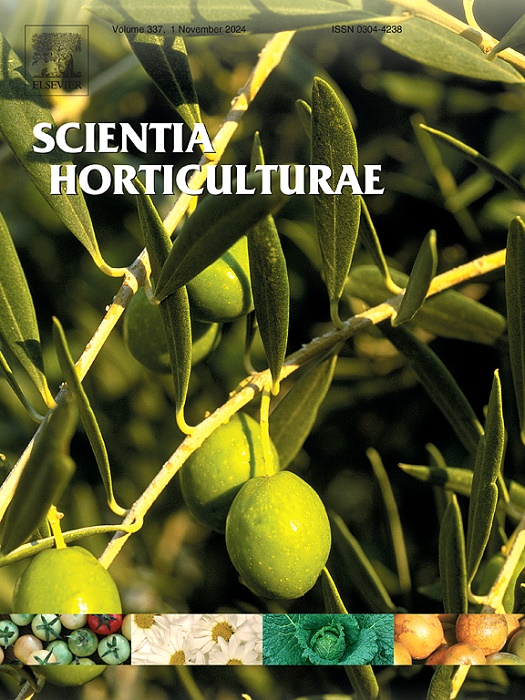过表达 SlMYB1R1 可提高番茄对寒冷胁迫的耐受性
IF 3.9
2区 农林科学
Q1 HORTICULTURE
引用次数: 0
摘要
低温会影响植物的生长和地理分布。本研究发现了一种 MYB 转录因子,它是番茄(Solanum lycopersicum)耐寒性的正调控因子,命名为 SlMYB1R1。过表达 SlMYB1R1(SlMYB1R1OE)株系在发芽期间的发芽活力和胚根长度显著高于野生型(Micro-Tom;MT)株系。SlMYB1R1OE 株系的叶角和叶长明显高于 MT 株系。此外,冷胁迫诱导了 SlMYB1R1 的表达。在寒冷胁迫下,SlMYB1R1OE植株的枯萎程度低于MT植株。在番茄中过表达 SlMYB1R1 会导致相对较低的电解质渗漏、丙二醛含量和活性氧水平。冷胁迫后,SlMYB1R1OE植株的过氧化物酶和过氧化氢酶的活性高于MT植株。在冷胁迫期间,SlMYB1R1OE 株系中四个冷相关基因的转录水平高于 MT 株系。这些结果表明,SlMYB1R1在番茄耐寒胁迫中起着关键作用。本文章由计算机程序翻译,如有差异,请以英文原文为准。
Overexpression of SlMYB1R1 improves chilling stress tolerance in tomato
Low temperatures can affect plant growth and geographical distribution. This study identified an MYB transcription factor, which is a positive regulator of chilling tolerance in tomato (Solanum lycopersicum), designated SlMYB1R1. The germination vigor and radicle lengths of overexpression SlMYB1R1 (SlMYB1R1OE) lines were significantly higher than those of the wild-type (Micro-Tom; MT) lines during germination. The leaf angle and leaf length of SlMYB1R1OE plants were significantly greater than those of MT plants. Furthermore, the expression of SlMYB1R1 was induced by cold stress. The degree of wilting was lower in SlMYB1R1OE plants than in MT plants under chilling stress. Overexpression of SlMYB1R1 in tomatoes resulted in low relative electrolyte leakage, malondialdehyde content, and reactive oxygen levels. The activities of peroxidase and catalase in SlMYB1R1OE plants were higher than those in MT plants after chilling stress. During cold stress, the transcriptional levels of the four cold-related genes were higher in SlMYB1R1OE lines than in MT plants. These results show that SlMYB1R1 plays key roles in tolerance to chilling stress in tomato.
求助全文
通过发布文献求助,成功后即可免费获取论文全文。
去求助
来源期刊

Scientia Horticulturae
农林科学-园艺
CiteScore
8.60
自引率
4.70%
发文量
796
审稿时长
47 days
期刊介绍:
Scientia Horticulturae is an international journal publishing research related to horticultural crops. Articles in the journal deal with open or protected production of vegetables, fruits, edible fungi and ornamentals under temperate, subtropical and tropical conditions. Papers in related areas (biochemistry, micropropagation, soil science, plant breeding, plant physiology, phytopathology, etc.) are considered, if they contain information of direct significance to horticulture. Papers on the technical aspects of horticulture (engineering, crop processing, storage, transport etc.) are accepted for publication only if they relate directly to the living product. In the case of plantation crops, those yielding a product that may be used fresh (e.g. tropical vegetables, citrus, bananas, and other fruits) will be considered, while those papers describing the processing of the product (e.g. rubber, tobacco, and quinine) will not. The scope of the journal includes all horticultural crops but does not include speciality crops such as, medicinal crops or forestry crops, such as bamboo. Basic molecular studies without any direct application in horticulture will not be considered for this journal.
 求助内容:
求助内容: 应助结果提醒方式:
应助结果提醒方式:


